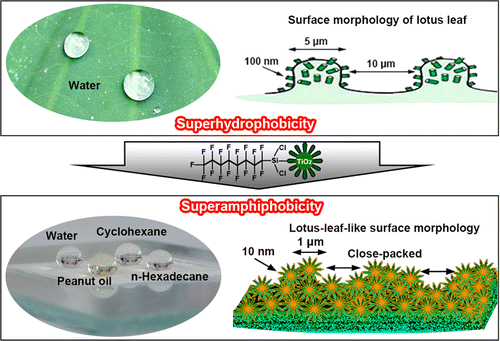Abstract: It is widely known that natural examples like lotus leaves can only repel room-temperature water but cannot repel hot water and oils. Even though superamphiphobic surfaces composed of re-entrant "mushroom-like" or "T-shaped" structures are promising, they are generally regarded as substrate-dependent and difficult to fabricate, and hence, their practical use on various materials has been limited. Here, we synthesize a flower-like superamphiphobic FOTS-TiO2 powder by solvothermal process and self-assembly functionalization. These structured and functionalized submicron particles can repel the liquids with surface tension as low as 23.8 mN.m-1 (n-decane), which is the lowest among powder samples. With respect to the biomimetic aspect, the surface morphology of FOTS-TiO2 particle is similar to the hierarchical micro/nano-structures of the lotus leaf surface, but it is beyond the lotus leaf for superoleophobic capacity. The difference in the oleophobicity is suggested to be the interplay of quasi-spherical re-entrant structure and perfluorined modification. Because of superior superamphiphobicity of the powder, a facile yet versatile strategy is developed, adhesive-assisted sieve deposition fabrication (AASDF), for preparing superamphiphobic coatings on various substrates. The investigation results pertaining to the water/oil proofing, mechanical durability, self-cleaning, and antifouling performances prove that the FOTS-TiO2 coating is robust and multifunctional, which will enable more opportunities for practical applications. Apart from these general applications, we find that the superamphiphobic FOTS-TiO2 powders when coated on sponge as anti-icing surface have good ice delay and icephobic performances. Furthermore, they can be used to prepare magnetic Fe3O4&FOTS-TiO2 composite particles through liquid marbles, implying significant scientific value. KeyWords Plus: SUPERHYDROPHOBIC COATINGS; SUPEROLEOPHOBIC SURFACES; ROBUST; TRANSPARENT; WETTABILITY; ADHESION; FABRICATION; WATER; TEMPLATE; LIQUIDS Published in ACS APPLIED MATERIALS & INTERFACES, 8 (40):27188-27198; 10.1021/acsami.6b06772 OCT 12 2016
|
